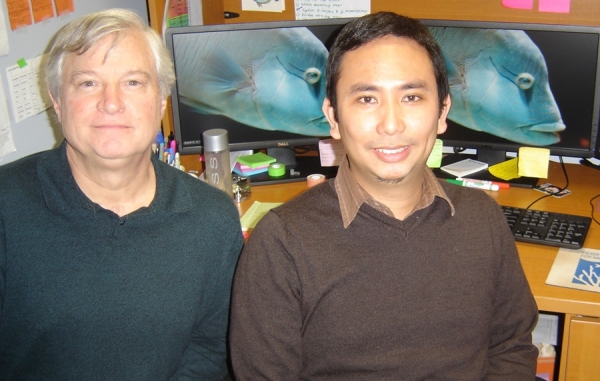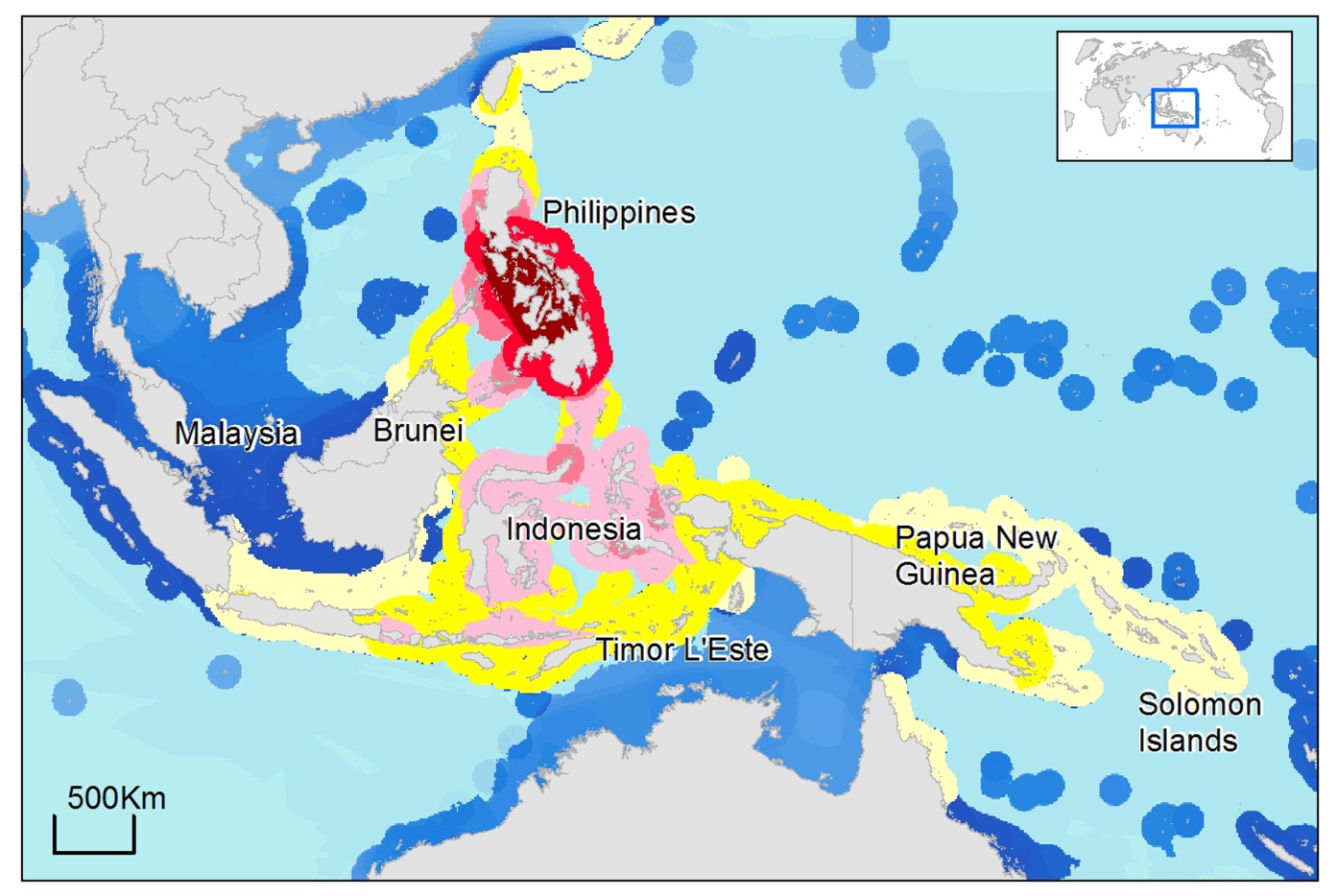Study Connects Marine Diversity with Sea Temperatures, Habitats
February 22, 2013
 Kent Carpenter with Jonnell Sanciangco
Kent Carpenter with Jonnell Sanciangco
 This map shows the pattern of species distribution in the Coral Triangle. The regions with highest concentrations of marine species (more than 3,250) are near the Philippines and are colored red on the map. More than 3,000 species are found a few hundred kilometers to the south in the Sulawesi region of Indonesia (shown in pink). The yellow colors around Indonesia, Brunei, Papua New Guinea, East Timor and Solomon Islands encompass the Coral Triangle and indicate a presence of more than 2,300 shallow water marine species.
This map shows the pattern of species distribution in the Coral Triangle. The regions with highest concentrations of marine species (more than 3,250) are near the Philippines and are colored red on the map. More than 3,000 species are found a few hundred kilometers to the south in the Sulawesi region of Indonesia (shown in pink). The yellow colors around Indonesia, Brunei, Papua New Guinea, East Timor and Solomon Islands encompass the Coral Triangle and indicate a presence of more than 2,300 shallow water marine species.
A new study involving Old Dominion University marine biologist Kent Carpenter finds that sea surface temperature, as well as the size and variety of habitats, are the main factors responsible for the proliferation of marine life in the Coral Triangle - the most biologically diverse marine region in the world, stretching from the Philippines to Indonesia to the Solomon Islands.
The results of the study, carried out by scientists from the International Union for Conservation of Nature (IUCN), Harte Research Institute for Gulf of Mexico Studies, the National Oceanic and Atmospheric Administration (NOAA) and ODU suggest that climate change may have a direct impact on species diversity and that larger and more diverse protected areas could help species respond to environmental changes, including changes in sea temperature.
"Similar studies have shown that the amount of available habitat enhances species diversity. This study is unique, as we found that sea surface temperature within the Indo-Pacific Warm Pool - the warmest area of seawater in the world - also enhances diversity and species evolution," said Carpenter, who manages IUCN's Marine Biodiversity Unit headquartered at ODU. "The conservation implication is that if climate change raises sea temperatures it may have a profound influence on extinction rates and how species are distributed over time."
The research team assembled the largest set of species distribution maps ever produced by experts for tropical, shallow-water marine species, including maps of coastal fishes, invertebrates (corals, crustaceans and mollusks), seagrasses and mangroves.
"We analyzed over 10,000 maps of marine species, and found that available habitat, represented by coastline length, best predicted species richness followed by the variety of habitats and sea surface temperature," said Jonnell Sanciangco, the lead author and a researcher who formerly worked at ODU with Carpenter and the Marine Biodiversity Unit of IUCN.
The Coral Triangle is traditionally recognized as a region encompassing the Philippines, eastern Sabah, eastern Indonesia, East Timor, Papua New Guinea and the Solomon Islands. Despite boasting the highest diversity anywhere in the oceans, the Coral Triangle faces many pressures, such as pollution, climate change and overfishing, as well as fishing practices that involve the use of explosives or sodium cyanide to stun the fish.
"The study suggests that marine-protected areas should be as large and diverse as possible to include more species, more habitats and more genetic diversity, and to offer species the best chance of adapting to sea temperature and other environmental changes," said Peter Etnoyer, a marine biologist at NOAA and a co-author of the study.
Based on the identification of areas with a high concentration of seagrasses and mangrove habitats that are associated with maintaining healthy coral reefs, which people in the Coral Triangle are dependent on for food and livelihoods, authors of the study suggest that the Coral Triangle should be extended to include western Indonesia, western Sabah, Brunei, Singapore and peninsular Malaysia, to ensure that these areas are included in the management and conservation of the region.
The study was published in PLoS One and can be viewed at http://tinyurl.com/axkrnsf.
Carpenter runs the Global Marine Species Assessment (GMSA) project from the Department of Biological Sciences at ODU. The GMSA team, which was created in 2005, is the marine biodiversity unit of the IUCN, and is currently participating in the first global review of the threat of extinction for every marine vertebrate species, plants and selected invertebrates.
Sanciangco worked for the GMSA for two years while he was studying for a master's degree at ODU under the mentorship of Carpenter.

